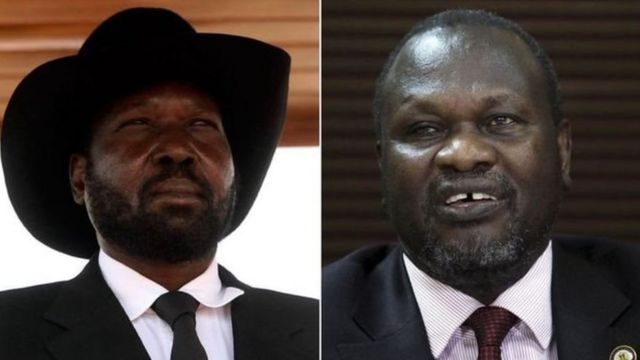
President Salva Kiir and FVP Dr. Riek Machar - courtesy
The First Vice President has said he and his boss will soon address the concern of whether the national security service should arrest anyone with or without a warrant.
The national security service act, 2014 which was amended in September 2019 still gives the blue house the power to arrest anyone without a warrant.
An arrest warrant is a document issued by a judge or magistrate that authorizes the police to take into custody someone accused of committing a crime.
The National Constitutional Amendment Committee or N.C.A.C first handed over the national security act to the minister of Justice and constitutional affairs in April 2019.
It was meant to ensure national security officers are held accountable for their actions and ensure that people arrested are not kept in custody without proper communication.
The act was also meant to set up a complaints board made of an independent body.
It was not indicated that national security would arrest anybody without an arrest warrant.
But later, the draft was sent back to the committee for amendment.
In September, the Council of Ministers also approved three security bills to adapt to the resolutions of the revitalized peace agreement.
The bills passed include the Prisons Service Act 2011, SPLA Act 2009, Fire Brigade, and Police Service Act 2009.
According to the revitalized peace deal, the National Constitutional Amendment Committee shall review and complete amendments to relevant national security legislation to bring their provisions into conformity with the agreement.
The bills were drafted in 2019.
However, the first vice president says a provision which is still disputed whether the national security personnel should have the mandate to arrest with a warrant or not.
Dr. Riek Machar said the matter is now expected to be resolved by President Salva Kiir and him.
“The national security still has one provision which needs to be agreed and the provision is whether the national security should be given the power to arrest with a warrant or not,” Dr. Machar said during the SPLM-IO national liberation council meeting in Juba on Thursday.
“That has been referred to the principles that are between me and the President. These laws are important for the formation of unified forces.
“The sooner the national legislature passes them because after all the laws came from the national constitutional amendment committee.
“They should go to parliament and the parliament in one week can pass them, and that will give us as one government the legal basis of unification of forces.”
Support Eye Radio, the first independent radio broadcaster of news, information & entertainment in South Sudan.
Make a monthly or a one off contribution.
Copyright 2024. All rights reserved. Eye Radio is a product of Eye Media Limited.